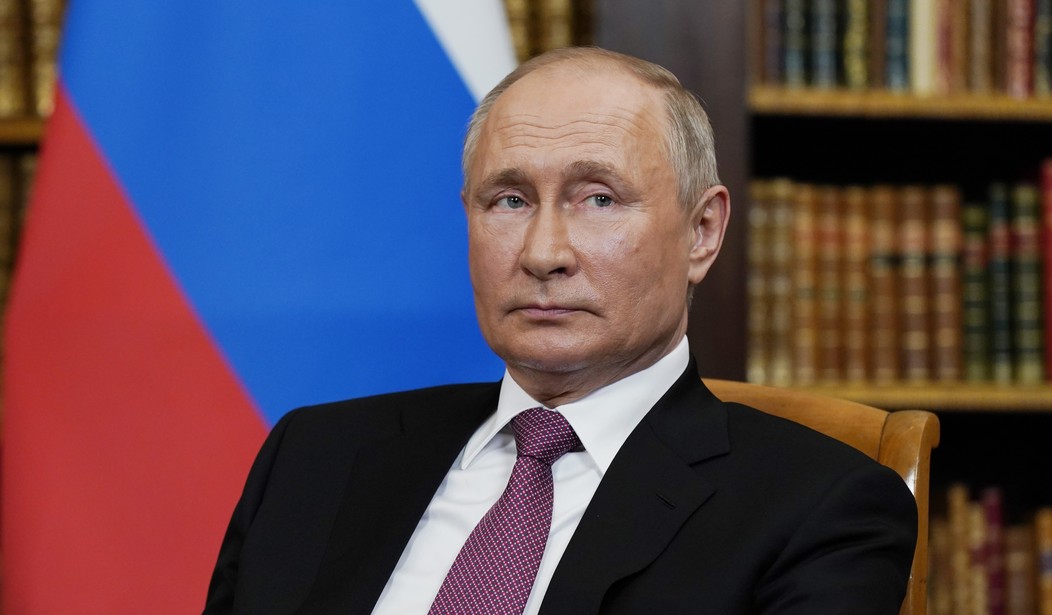Emmanuel Macron’s lips say oui oui oui, but Vladimir Putin’s said nyet. Who’s telling the truth? After Putin denied that he and the French president had agreed on a formula to exit the Ukraine crisis, Macron insisted that Putin pledged not to push it any farther:
French President Emmanuel Macron said Tuesday that Russian President Vladimir Putin told him in their marathon talks a day earlier that Moscow would not further escalate the Ukraine crisis.
Macron’s remarks on a visit to Kyiv came as the Kremlin denied reports that he and Putin struck a deal on de-escalating the crisis. Kremlin spokesman Dmitry Peskov said that “in the current situation, Moscow and Paris can’t be reaching any deals.” …
At a news conference after meeting Zelenskyy, Macron said Putin told him during their more than five-hour session Monday that “he won’t be initiating an escalation. I think it is important.”
According to the French president, Putin also said there won’t be any Russian “permanent (military) base” or “deployment” in Belarus, where Russia had sent a large number of troops for war games.
On that point, at least, Russia has provided confirmation. Sorta. Earlier today, Putin spokesperson told reporters that the Kremlin planned to withdraw troops from Belarus all along after their joint military drills were completed. The talks with Macron had nothing to do with that decision, Dmitry Peskov insisted:
Macron said on Tuesday that he believed his meeting with Putin would help to prevent a further escalation of the crisis, but the Kremlin quickly shot down reports that the Russian leader had agreed to refrain from further military exercises in the region.
Putin’s spokesman, however, did appear on Tuesday to try to ease any concerns that the thousands of Russian forces deployed to Belarus in recent weeks for the military exercises might remain there.
“No one ever said that Russian troops would remain on the territory of Belarus, there was no talk of this,” Kremlin spokesman Dmitry Peskov told reporters. “We are talking about allied exercises, and it is understood that after these exercises are completed, the troops will return to their permanent locations.”
Is it “understood”? It looked a lot more like preparations for an assault on Kyiv, especially with Russian troops crowding the eastern border of Ukraine. Kyiv is a lot closer to Belarus than Russia, after all, although a ground assault from that direction would have to plow through the radioactive ground in the same region as Chernobyl. That would be asking a lot from even a trained and highly motivated infantry, especially because it would require manned lines of communication to remain stationary in Glowinthedarkistan for a few weeks, at least. That kind of mission would test even the most battle-seasoned and high-morale forces, and there’s little evidence that Russian forces are anywhere near that state.
Ordering such an invasion could backfire on Putin, and at the least would certainly be costly in multiple ways. Putin may have decided that he’s already getting his money’s worth, one Russian military analyst tells CBS:
Russian military analyst Alexander Baunov told CBS News foreign correspondent Imtiaz Tyab that in some ways, Putin is using the mere threat of military action to get what he wants: World powers negotiating amongst themselves over his security demands to prevent war.
“The fear of the war is a working political instrument,” Baunov told CBS News, to “make Russian demands and Russian concerns to be listened to.”
The inherent risk in this coercive form of diplomacy, Tyab noted, is if Russia doesn’t gain something, and soon, Putin may decide he has to use force to avoid looking weak.
This is the Russian version of the madman theory of foreign policy. Better give him what he wants or who knows what he’ll do? Not coincidentally, former US ambassador to Germany Richard Grenell and I discussed that strategy in today’s podcast of The Ed Morrissey Show. Joe Biden has been too predictably pliant and too much a carbon copy of Barack Obama to offer much deterrence to Putin, Grenell argues (among other criticisms). The panicked evacuation of diplomatic personnel from Kyiv in particular, Grenell argues, sent all the wrong signals to Putin at just the wrong time.
The counter to Tyab’s point is Putin’s control over domestic media and critics. Putin doesn’t need to worry nearly as much about losing a diplomatic exchange, as he can always spin whatever he does get as A Great Patriotic Victory without much fear of contradiction. Even his critics will likely be relieved if Putin skips a war in Ukraine. But if Putin launches an invasion and it gets bogged down at all, the body count will be much more difficult to hide, as well as the loss of the massive capital costs necessary for such an adventure. If Russians learned anything from Afghanistan, it’s how destabilizing a bad military occupation can be both politically and economically. Putin has to have that in mind as well in terms of how an occupation of non-ethnic-Russian Ukraine would play out.
That may well be why Putin offered that he won’t “further escalate” issues in Ukraine. So far, everything he’s done has been relatively cost-free, and it has forced the West to come to the table on his terms rather than ours. Putin will likely play a good hand to its limit, a limit that appears to be approaching quickly. And so is Putin’s decision point.








Join the conversation as a VIP Member